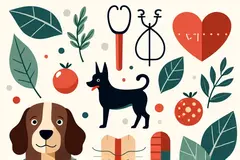 Understanding why dogs engage in the behavior of burying food can provide insight into their natural instincts and evolutionary history. This practice is rooted in survival tactics that wild canids used to store surplus food for later consumption.
Instinctual Behavior
Dogs, as descendants of wolves... ↪ Read more
Understanding why dogs engage in the behavior of burying food can provide insight into their natural instincts and evolutionary history. This practice is rooted in survival tactics that wild canids used to store surplus food for later consumption.
Instinctual Behavior
Dogs, as descendants of wolves... ↪ Read more Veterinary Drug Handbook (VDH) is the reference veterinarians turn to when they want an independent source of information on the drugs that are used in veterinary medicine today.
-
 Is veterinary Liniment Gel safe for humans?
Is veterinary Liniment Gel safe for humans? -
 Giving Your Cat A Pill
Giving Your Cat A Pill -
 Dog Aggression
Dog Aggression -
 Dogs May Help Boost Infant Health
Dogs May Help Boost Infant Health -
 Animal-Assisted Therapy, Veterinary Social Work, & Social Work With People & Pets in Crisis
Animal-Assisted Therapy, Veterinary Social Work, & Social Work With People & Pets in Crisis -
 On-demand veterinary service gives advice on poorly pets
On-demand veterinary service gives advice on poorly pets -
 Should we stop throwing sticks for dogs?
Should we stop throwing sticks for dogs? -
 What does PU/PD mean in veterinary medicine?
What does PU/PD mean in veterinary medicine? -
 Can breathing in cat hair be harmful?
Can breathing in cat hair be harmful? -
 Bill calls for ban on sales of dogs, cats in Maine pet stores
Bill calls for ban on sales of dogs, cats in Maine pet stores -
 What does DVM stand for in veterinary?
What does DVM stand for in veterinary? -
 Common Meanings Of Cat Behavior
Common Meanings Of Cat Behavior -
 Curing Bad Cat Breath
Curing Bad Cat Breath -
 New Tracking Tool for Pathogen Investigators
New Tracking Tool for Pathogen Investigators -
Can binturongs be kept as pets?
-
 How long do instruments stay sterile after autoclaving veterinary?
How long do instruments stay sterile after autoclaving veterinary?
Why does my dog bury its food?
 Understanding why dogs engage in the behavior of burying food can provide insight into their natural instincts and evolutionary history. This practice is rooted in survival tactics that wild canids used to store surplus food for later consumption.
Instinctual Behavior
Dogs, as descendants of wolves... ↪ Read more
Understanding why dogs engage in the behavior of burying food can provide insight into their natural instincts and evolutionary history. This practice is rooted in survival tactics that wild canids used to store surplus food for later consumption.
Instinctual Behavior
Dogs, as descendants of wolves... ↪ Read more Why does my dog eat grass?
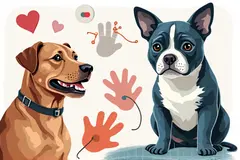 Understanding Canine Behavior: Why Dogs Eat Grass
Dogs eating grass is a common behavior that many pet owners observe. While this action might seem unusual or concerning, it is generally considered normal and can serve several purposes for your canine companion.
One of the primary reasons dogs... ↪ Read more
Understanding Canine Behavior: Why Dogs Eat Grass
Dogs eating grass is a common behavior that many pet owners observe. While this action might seem unusual or concerning, it is generally considered normal and can serve several purposes for your canine companion.
One of the primary reasons dogs... ↪ Read more What is veterinary medicine?
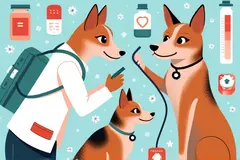 Understanding the Role of a Veterinarian
A veterinarian, often referred to as a vet, is a licensed medical professional who specializes in the diagnosis and treatment of diseases, injuries, and other health problems in animals. These professionals are trained to perform various procedures,... ↪ Read more
Understanding the Role of a Veterinarian
A veterinarian, often referred to as a vet, is a licensed medical professional who specializes in the diagnosis and treatment of diseases, injuries, and other health problems in animals. These professionals are trained to perform various procedures,... ↪ Read more Can tarantulas be kept as pets?
 When considering whether tarantulas make suitable pets, it is important to evaluate several factors. Tarantulas are generally low-maintenance compared to other exotic animals, requiring minimal interaction and a simple habitat setup. They do not need daily handling or socialization, which can be... ↪ Read more
When considering whether tarantulas make suitable pets, it is important to evaluate several factors. Tarantulas are generally low-maintenance compared to other exotic animals, requiring minimal interaction and a simple habitat setup. They do not need daily handling or socialization, which can be... ↪ Read more Do guinea pigs need salt lamps?
 When considering whether salt lamps improve health in guinea pigs, it is essential to approach the topic with scientific scrutiny. Salt lamps are marketed for their purported benefits such as air purification and improved mood through negative ion emission. However, there is limited empirical... ↪ Read more
When considering whether salt lamps improve health in guinea pigs, it is essential to approach the topic with scientific scrutiny. Salt lamps are marketed for their purported benefits such as air purification and improved mood through negative ion emission. However, there is limited empirical... ↪ Read more What causes dry skin in dogs?
 Common Causes of Dry Skin in Dogs
Dry skin is a prevalent issue among canines and can be caused by several factors. One primary cause is environmental conditions such as low humidity, cold weather, or frequent exposure to wind and sun. These elements strip the dog's coat of its natural oils,... ↪ Read more
Common Causes of Dry Skin in Dogs
Dry skin is a prevalent issue among canines and can be caused by several factors. One primary cause is environmental conditions such as low humidity, cold weather, or frequent exposure to wind and sun. These elements strip the dog's coat of its natural oils,... ↪ Read more Can dogs eat tomatoes safely?
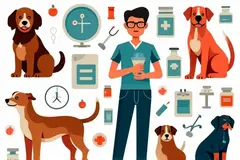 Can Dogs Safely Consume Tomatoes?
Dogs can enjoy a variety of human foods in moderation; however, it is important for pet owners to be aware that not all human edibles are safe for canine consumption. One such item that requires caution is the tomato.
Tomatoes contain a compound called Solanine,... ↪ Read more
Can Dogs Safely Consume Tomatoes?
Dogs can enjoy a variety of human foods in moderation; however, it is important for pet owners to be aware that not all human edibles are safe for canine consumption. One such item that requires caution is the tomato.
Tomatoes contain a compound called Solanine,... ↪ Read more Are cockroaches legal as pets?
 While many unconventional pets are becoming increasingly popular in the United States, cockroaches remain a controversial choice. The legality of keeping roaches as pets largely depends on local regulations and zoning laws. In general, there is no federal law prohibiting cockroaches as pets;... ↪ Read more
While many unconventional pets are becoming increasingly popular in the United States, cockroaches remain a controversial choice. The legality of keeping roaches as pets largely depends on local regulations and zoning laws. In general, there is no federal law prohibiting cockroaches as pets;... ↪ Read more Do vets offer wellness plans?
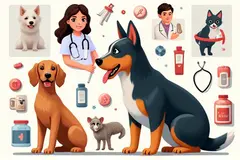 When it comes to veterinary care in the USA, many pet owners wonder if all veterinary clinics provide wellness plans. While not every clinic offers a comprehensive wellness plan, an increasing number of practices do incorporate such programs into their services.
Understanding Wellness... ↪ Read more
When it comes to veterinary care in the USA, many pet owners wonder if all veterinary clinics provide wellness plans. While not every clinic offers a comprehensive wellness plan, an increasing number of practices do incorporate such programs into their services.
Understanding Wellness... ↪ Read more Can dik-diks be kept as pets?
 Domestication of Dik-Diks: A Veterinary Perspective
Dik-diks (Madoqua kirkii) are small antelope native to Africa, known for their agility and unique appearance. These animals are typically found in grasslands and savannas. While they are fascinating creatures from a wildlife perspective, the... ↪ Read more
Domestication of Dik-Diks: A Veterinary Perspective
Dik-diks (Madoqua kirkii) are small antelope native to Africa, known for their agility and unique appearance. These animals are typically found in grasslands and savannas. While they are fascinating creatures from a wildlife perspective, the... ↪ Read more What causes weight gain in pets?
 Understanding the root causes of pet obesity is crucial for maintaining the health and well-being of companion animals. Pet obesity is primarily caused by an imbalance between calorie intake and energy expenditure. Overfeeding, especially with high-calorie treats and snacks, can lead to weight gain... ↪ Read more
Understanding the root causes of pet obesity is crucial for maintaining the health and well-being of companion animals. Pet obesity is primarily caused by an imbalance between calorie intake and energy expenditure. Overfeeding, especially with high-calorie treats and snacks, can lead to weight gain... ↪ Read more Can axolotls be kept as pets?
 I don't know. However, based on available information, I can provide a crafted response for an expert:
Can Axolotls Live Out of Water?
Axolotls are fully aquatic salamanders native to the freshwater lakes of Mexico. Unlike many amphibians that transition between water and land at various stages of... ↪ Read more
I don't know. However, based on available information, I can provide a crafted response for an expert:
Can Axolotls Live Out of Water?
Axolotls are fully aquatic salamanders native to the freshwater lakes of Mexico. Unlike many amphibians that transition between water and land at various stages of... ↪ Read more Popular Diagnoses
Packed cell volume (PCV, hematocrit) Reflex ovulator Mucolytic Microfilaricide Bronchodilator Hematocrit Glucocorticoid Monoamine oxidase inhibitor (MAOI) ↪ All veterinary diagnoseOther Diagnoses
Synergist Synovial Systemic T cell Tachycardia Tartar Third generation ThrombocytopeniaPopular Veterinary Clinics
VCA Welborn Animal Hospital, 7860 Washington Avenue Kansas City, KS 66112 USA MedVet Columbus, 300 East Wilson Bridge Road, Worthington, OH Rutland Veterinary Clinic & Surgical Center, 90 East Pittsford Road, Rutland, VT VCA Paradise Valley Emergency Animal Hospital, 6969 East Shea Boulevard Suite 150 Scottsdale, AZ 85254 USA Connecticut Veterinary Center & Pet ER, 470 Oakwood Ave West Hartford, CT 06110 USA Norway Veterinary Hospital, 10 Main St P.O. Box 273 Norway, ME 04268 USA Craig Road Animal Hospital, 5051 West Craig Road, Las Vegas, NV Abri Veterinary Hospital Inc, 1449 Trademart Boulevard Winston-Salem, NC 27127 USA ↪ All veterinary clinicsOther Veterinary Clinics
Hanford Veterinary Hospital Inc, 9086 E LACEY BLVD PO Box 1758 HANFORD, CA 93232 USA Tulare Veterinary Hospital, 861 North Blackstone Avenue, Tulare, CA Uptown Animal Hospital, 3350 Atlantic Ave Long Beach, CA 90807 USA Plaza Del Amo Animal Hospital & Pet Keeper, 3430 Fujita St. Torrance, CA 90505 USA Laurel Pet Hospital, 7970 Santa Monica Boulevard, West Hollywood VCA Animal Hospital of Burbank, 2723 West Olive Avenue Burbank, CA 91505 USA Culver City Animal Hospital Inc, 5830 Washington Boulevard Culver City, CA 90232 USA Sherman Oaks Veterinary Group, 13624 Moorpark Street Sherman Oaks, CA 91423 USAPopular Drugs
DOXYLAMINE SUCCINATE Doses - PENICILLIN V POTASSIUM Doses - METHYLPREDNISOLONE, METHYLPREDNISOLONE ACETATE, METHYLPREDNISOLONE SODIUM SUCCINATE ACEPROMAZINE MALEATE Doses - PREDNISOLONE, PREDNISOLONE SODIUM SUCCINATE, PREDNISOLONE ACETATE, PREDNISONE Doses - FURAZOLIDONE Doses - FERROUS SULFATE Doses - LEVAMISOLE ↪ All veterinary drugOther Drugs
Oxytocin Injection Purified Oxytocic Principle (20 USP Units per mL) FOR ANIMAL USE ONLY HAZARDOUS KEEP OUT OF REACH OF CHILDREN Ivermectin (ivermectin) Pour-On for Cattle ANADA 200-318, Approved by FDA Contains 5 mg ivermectin / mL Parasiticide Consult your veterinarian for assistance in the diagnosis, treatment and control of parasitism. Introduction: IVERMECTIN (iveremctin) Pour SOLOXINE® (LEVOTHYROXINE SODIUM) TABLETS Ivermax (ivermectin) Pour-On for Cattle ANADA 200-318, Approved by FDA Contains 5 mg ivermectin / mL Parasiticide Consult you veterinarian for assistance in the diagnosis, treatment and control of parasitism. Introduction: Ivermax (ivermectin) Pour-On del TOXI-SORB BOLUS Bimeda, Inc. Division of Cross Vetpharm Group SulfaMed-G (brand of Sulfadimethoxine) Soluble Powder ANADA 200-376, Approved by FDA Droncit® (praziquantel) Neo-Sol® 50Popular Terms
Subalbinotic Steatis Uteroverdin Paradoxical CSF acidosis Figure of 8 suture pattern Nerve root signature Ovariohysterectomy Abrev OVH Signalment ↪ All veterinary termOther Terms
Insensible fluid loss Inter-estrus interval Inter-trochanteric fossa Interceptor Interdigital pyoderma Interferon Interleukins Intermediate hostveterinary-help.com
© 2011-2026 Veterinary Clinics, Diagnoses, Terms and Drug Handbook Online

